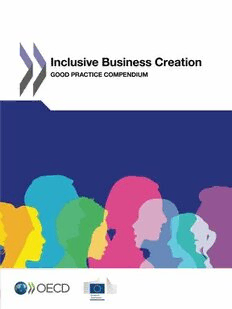Table Of ContentInclusive Business Creation
Good PraCtICe ComPendIum
Contents
Executive summary
Reader’s guide
Inclusive Business Creation
Part I. Challenges, options and success factors for inclusive business creation policy
Chapter 1. Key policy issues and approaches to inclusive business creation Good PraCtICe ComPendIum
Chapter 2. Ingredients of successful inclusive business creation programmes
Part II. Good practice examples of inclusive entrepreneurship programmes
Business Start-up Programme, Austria
DreamStart, Belgium (Brussels)
Entrepreneurship Works, Belgium (Flanders)
Women in the Labour Market, Croatia
Business Coaching for Ethnic Minorities, Denmark
Start-up Grant, Finland
Adie Microfranchising, France
New Start-up Subsidy, Germany
Kiútprogram, Hungary
Going for Growth, Ireland In
Invitalia’s Entrepreneurship Support for the Unemployed, Italy c
lu
Measure for Commencing Commercial Activity or Self-employment, Latvia s
iv
Entrepreneurship Promotion Fund, Lithuania e B
Welfare Support for the Self-employed (BBZ), Netherlands u
s
in
Mature Entrepreneur, Poland e
s
Entrepreneurially into the World of Business, Slovenia s
C
Launching Pads for Employment and Entrepreneurship, Spain r
e
a
Women Ambassadors, Sweden t
io
Access to Work, United Kingdom n
G
Prowess, United Kingdom o
o
d
P
r
a
C
t
IC
e
C
o
m
P
e
n
Consult this publication on line at http://dx.doi.org/10.1787/9789264251496-en. d
Iu
m
This work is published on the OECD iLibrary, which gathers all OECD books, periodicals and statistical databases.
Visit www.oecd-ilibrary.org for more information.
IsBn 978-92-64-25129-8
84 2016 01 1 P
Inclusive Business
Creation
GOOD PRACTICE COMPENDIUM
ThisworkispublishedundertheresponsibilityoftheSecretary-GeneraloftheOECD.The
opinionsexpressedandargumentsemployedhereindonotnecessarilyreflecttheofficial
viewsofOECDmembercountriesortheEuropeanUnion.
This document and any map included herein are without prejudice tothe status of or
sovereigntyoveranyterritory,tothedelimitationofinternationalfrontiersandboundaries
andtothenameofanyterritory,cityorarea.
Pleasecitethispublicationas:
OECD/EU(2016),InclusiveBusinessCreation:GoodPracticeCompendium,OECDPublishing,Paris.
http://dx.doi.org/10.1787/9789264251496-en
ISBN978-92-64-25129-8(print)
ISBN978-92-64-25149-6(PDF)
EuropeanUnion:
ISBN:978-92-79-57968-4(print)
ISBN:978-92-79-57654-6(PDF)
Cataloguenumber:KE-01-16-314-EN-C(print)
Cataloguenumber:KE-01-16-314-EN-N(PDF)
ThestatisticaldataforIsraelaresuppliedbyandundertheresponsibilityoftherelevantIsraeliauthorities.Theuse
ofsuchdatabytheOECDiswithoutprejudicetothestatusoftheGolanHeights,EastJerusalemandIsraeli
settlementsintheWestBankunderthetermsofinternationallaw.
Photocredits:Cover©iStockphoto.com/KevinSmart
CorrigendatoOECDpublicationsmaybefoundonlineat:www.oecd.org/about/publishing/corrigenda.htm.
©OECD/EuropeanUnion,2016
Youcancopy,downloadorprintOECDcontentforyourownuse,andyoucanincludeexcerptsfromOECDpublications,databasesand
multimediaproductsinyourowndocuments,presentations,blogs,websitesandteachingmaterials,providedthatsuitable
acknowledgementofOECDassourceandcopyrightownerisgiven.Allrequestsforpublicorcommercialuseandtranslationrightsshould
besubmittedtorights@oecd.org.Requestsforpermissiontophotocopyportionsofthismaterialforpublicorcommercialuseshallbe
addresseddirectlytotheCopyrightClearanceCenter(CCC)[email protected]çaisd’exploitationdudroitdecopie(CFC)
[email protected].
FOREWORD
Foreword
S
timulatingsuccessfulbusinesscreationacrossallsectionsofsocietyisanimportantrequirement
for achieving smart, sustainable and inclusive growth and responding to economic and social
challenges in European Union countries. Entrepreneurship can respond to high rates of
unemployment and low levels of labour market participation which are often concentrated in
particular sections of society by enabling people to create their own jobs and jobs for others. It is
fundamental to the emergence of a more entrepreneurial economy in which new firms offer new
solutionstosocial,economicandenvironmentalchallenges.However,manypeoplefacebarriersto
entrepreneurship. They include access to finance, lack of appropriate skills, and lack of business
networks.Theseobstaclesareoftenmoreimportantforpeoplefromgroupsthataredisadvantaged
and under-represented in entrepreneurship, who often face additional barriers related to attitudes,
motivations and welfare systems that discriminate against entrepreneurship. Both business
developmentpoliciesandactivelabourmarketpolicieshavearoletoplayinhelpingovercomethese
problems.Appropriateactionscanbetakenatnational,regionalandlocallevelsandtargetedatkey
groups such as youth, women, seniors, the unemployed, immigrants, ethnic minorities and people
withdisabilities.Thiscompendiumidentifiesthetypesofpolicyapproachesthatworkinovercoming
theproblemsanddiscusseskeyfactorsfortheirsuccessfulimplementation.
ItisintendedtoinspirepolicymakersinEuropeandbeyondtointroducenewnationalandlocal
actionstogivepeoplefromallpartsofsocietytheopportunitytosucceedinbusinesscreationand
self-employment, drawing on experiences that have been tried and tested elsewhere. Relevant
actions can be piloted and implemented using a range of local, regional, national and
EuropeanUnion funds that are available for this purpose, including the European Structural and
Investment Funds and national active labour market policy resources, but appropriate plans and
proposals have to be put into place and implemented. This compendium contains a variety of
examplesofapproachesthatcanbetaken.Thedescriptionsofthesepolicyactionsnotonlypresent
the programmes’ activities, but also discuss the challenges faced in their development and
implementation, and the keys to successfully transferring the approach to a different context.The
intention is to help transfer the experiences and lessons learned so that others can avoid common
pitfallsandachieveresultsmorequickly.
This compendium is part of an on-going collaboration on inclusive entrepreneurship between
theCentreforEntrepreneurship,SMEsandLocalDevelopmentoftheOrganisationforEconomicCo-
operationandDevelopment(OECD)andtheDirectorate-GeneralforEmployment,SocialAffairsand
InclusionoftheEuropeanCommission.Oneofthekeyobjectivesofthiscollaborationistosupport
capacity development for policy makers through the provision of evidence and guidance on what
works.OtheroutputsavailableincludeaseriesofpolicybriefsandasetofMissingEntrepreneurs
reportsthatprovidepolicyadviceonspecifictargetgroupsandpolicytools.Formoreinformationon
this work programme, please refer to: www.oecd.org/employment/leed/inclusive-
entrepreneurship.htm.
INCLUSIVEBUSINESSCREATION:GOODPRACTICECOMPENDIUM©OECD/EUROPEANUNION,2016 3
TABLEOFCONTENTS
Table of contents
Acknowledgements......................................................... 9
Executivesummary......................................................... 11
PartI
Challenges,optionsandsuccessfactorsforinclusivebusinesscreationpolicy
Chapter1.Keypolicyissuesandapproachestoinclusivebusinesscreation........ 17
Factsandfiguresoninclusivebusinesscreation............................. 17
Mainpolicyapproachesforsupportinginclusiveentrepreneurship ............ 21
References ............................................................. 25
Chapter2.Ingredientsofsuccessfulinclusivebusinesscreationprogrammes ...... 27
Keystosuccess......................................................... 27
References ............................................................. 36
PartII
Goodpracticeexamplesofinclusiveentrepreneurshipprogrammes
BusinessStart-upProgramme,Austria ......................................... 61
DreamStart,Belgium(Brussels) ............................................... 67
EntrepreneurshipWorks,Belgium(Flanders).................................... 73
WomenintheLabourMarket,Croatia ......................................... 81
BusinessCoachingforEthnicMinorities,Denmark .............................. 86
Start-upGrant,Finland ...................................................... 91
AdieMicrofranchising,France ................................................ 96
NewStart-UpSubsidy,Germany .............................................. 101
Kiútprogram,Hungary....................................................... 107
GoingforGrowth,Ireland .................................................... 113
Invitalia’sEntrepreneurshipSupportfortheUnemployed,Italy.................... 120
MeasureforCommencingCommercialActivityorSelf-Employment,Latvia......... 127
EntrepreneurshipPromotionFund,Lithuania................................... 132
WelfareSupportfortheSelf-Employed(BBZ),Netherlands........................ 139
MatureEntrepreneur,Poland ................................................. 146
EntrepreneuriallyIntotheWorldofBusiness,Slovenia ........................... 150
LaunchingPadsforEmploymentandEntrepreneurship,Spain .................... 156
WomenAmbassadors,Sweden................................................ 162
INCLUSIVEBUSINESSCREATION:GOODPRACTICECOMPENDIUM©OECD/EUROPEANUNION,2016 5
TABLEOFCONTENTS
AccesstoWork,UnitedKingdom.............................................. 167
Prowess,UnitedKingdom.................................................... 173
Boxes
1.1. Entrepreneurshipskills............................................... 21
1.2. Deadweightcostsanddisplacementeffects ............................. 24
2.1. Examplesofdevelopingandimplementingprojects
withinintegratedstrategies........................................... 28
2.2. Examplesofdefiningobjectivesandtargets............................. 29
2.3. Anexampleofoutreachusingthemedia ............................... 30
2.4. Examplesofoutreachusingword-of-mouthandevents................... 30
2.5. Anexampleofusingcompetitiontoawardsupport ...................... 31
2.6. Examplesoffilteringmechanisms ..................................... 31
2.7. Examplesofworkingwithpartnerstodelivertraining.................... 32
2.8. Anexampleofaccreditingbusinessdevelopmentsupportorganisations .... 32
2.9. Examplesoflearningfrompilotprojects................................ 34
2.10. Examplesofextensiveevaluation...................................... 34
3.1. TransferringtheAustrianBusinessStart-upProgrammeexperiencetoRomania.. 66
5.1. Lookingforward:EntrepreneurshipWorks–Thesequel................... 79
7.1. ABusinessCoachingforEthnicMinoritiesparticipantprofile:
Maria,psychologist .................................................. 89
7.2. ABusinessCoachingforEthnicMinoritiesparticipantprofile:
Arefugeeshoemaker................................................. 89
9.1. TypesofAdiemicrofranchises......................................... 98
12.1. The2014GoingforGrowthpilotroundtableinFinland ................... 118
Tables
2.1. Keyevaluationcriteria ............................................... 33
3.1. Start-upsurvivalratesintheBusinessStart-upProgramme ............... 65
5.1. ProfileoftheparticipantsinEntrepreneurshipWorks,2009-14............. 75
5.2. FinancingofEntrepreneurshipWorksI,IIandIII......................... 76
5.3. AveragecostpercounsellingtrajectoryinEntrepreneurshipWorks......... 76
5.4. NumberofEntrepreneurshipWorksparticipantstransitioning
toself-employmentandemployment .................................. 78
13.1. Invitalia’sentrepreneurshipsupportactivitiesfortheunemployed ......... 122
13.2. ResultsfromtheInvitalia’sEntrepreneurshipSupport
fortheUnemployedProgramme,1996-2013 ............................. 124
13.3. PersonalcharacteristicsofindividualsonInvitalia’sEntrepreneurship
SupportfortheUnemployedProgramme ............................... 125
14.1. NumberofparticipantsintheMeasureforCommencingCommercial
ActivityorSelf-Employment .......................................... 128
14.2. CostperpersonbycomponentoftheMeasureforCommencing
CommercialActivityorSelf-Employment,2014 .......................... 129
15.1. FundingfortheEntrepreneurshipPromotionFundCentralFund,2009-15 ... 136
15.2. ImpactsoftheEntrepreneurshipPromotionFundprogramme2010-14...... 137
16.1. NationalgovernmentfundingofBBZ,2012.............................. 142
16.2. ComponentcostsfortheBBZBDSserviceandannualnumberofclients,2012.. 142
16.3. EstimatedcostsandbenefitsofBBZperstarter.......................... 144
6 INCLUSIVEBUSINESSCREATION:GOODPRACTICECOMPENDIUM©OECD/EUROPEANUNION,2016
TABLEOFCONTENTS
18.1. Keymetricsforthe3projectphasesofEntrepreneuriallyIntotheWorld
ofBusiness ......................................................... 154
19.1. Costsforeachlaunchpad............................................. 159
22.1. ProwessFlagshipStandards........................................... 175
Figures
1.1. NewbusinessownershipratesintheEuropeanUnion,2009-13(combined).. 18
1.2. Preferenceforandfeasibilityofself-employmentinEU28countries,2012 ... 19
1.3. BarrierstobusinesscreationinEU28countries,2012 ..................... 20
4.1. ThecomponentsofDreamStart’straining............................... 68
9.1. Adiemicrofranchisingframework...................................... 97
13.1. Operationalprocess,managementandactivitiesofInvitalia’s
EntrepreneurshipSupportfortheUnemployedProgramme................ 123
15.1. ImplementingtheEntrepreneurshipPromotionFund..................... 134
15.2. ComponentsoftheEntrepreneurshipPromotionFundprogramme,2009-15 . 135
16.1. TheBBZprocess..................................................... 140
INCLUSIVEBUSINESSCREATION:GOODPRACTICECOMPENDIUM©OECD/EUROPEANUNION,2016 7

